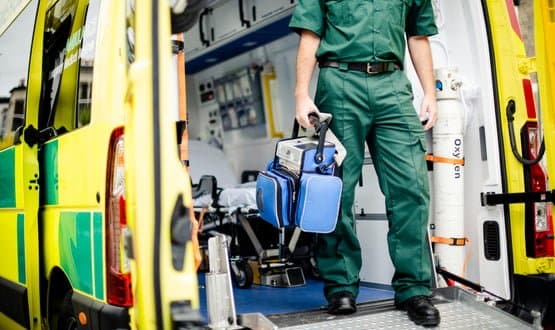Ambulance crews across England are to have access to tens of thousands of iPads in order to give patients the right care faster.
The 30,000 devices will allow ambulance crews to send photographs from the scene of an accident so stroke specialists and other clinicians on standby in emergency departments can get straight to work when the patient arrives at hospital.
Paramedics will also be able to access health records so they can assess patients’ injuries and decide whether they should be taken to hospital or treated at the scene. Patient information can also be sent ahead to speed up handovers and free the ambulance up to attend another call.
The initiative is due to be announced by NHS chief executive, Sir Simon Stevens, at the the Ambulance Leadership Forum on May 18.
Stevens said: “Ambulance crews have been at the forefront of the pandemic, routinely dealing with life and death situations and often first on scene to treat and diagnose critically ill patients.
“These devices are another tool for our highly skilled paramedics and ambulance technicians as they continue to respond to the country’s most critically ill and injured patients.
“It is another example of the health service innovating and harnessing technology to improve patient care as part of the NHS Long Term Plan.”
The NHS Long Term Plan committed to providing staff working in the community with mobile devices and digital services.
The initiative is funded by NHSX and while the ratio of iPads to staff will vary based on need, in some areas including London, every ambulance worker will have access to one.
Matthew Gould, chief executive of NHSX, added: “At NHSX we are working to help frontline staff use digital technology to transform the service they provide, and these tablets will give paramedics an extra edge.”
The use of iPads has been piloted by ambulance crews in London and the South East, with early results showing how effective having access to vital information or specialist medical advice can be to emergency call outs.
South East Coast Ambulance has been using the tablets to video call consultants when attending stroke patients, to provide faster and more specialised care until they reach hospital.
Paramedics treating those suspected of suffering a stroke can dial in senior doctors, who via video, can assess a patient’s condition and advise on the best course of action.
While at London Ambulance Service, paramedics use digitised patient records to benefit their clinical decision-making, helping to ensure patients receive the most effective treatment tailored to their medical history.
The ambulance services which will receive tablets are:
- East Midlands Ambulance Service
- London Ambulance Service
- North West Ambulance Service
- South Central Ambulance Service
- South East Coast Ambulance Service
- South Western Ambulance Service
- West Midlands Ambulance Service
- Yorkshire Ambulance Service
- Isle of Wight NHS Trust


18 May 2021 @ 10:51
This news makes me very proud in two ways: professionally as part of the team that helped East of England procure iPads last year to realise the benefits referenced in the article; and personally as the father of a Paramedic who uses an iPad as part of her job now.
Great news and I look forward to seeing all paramedics, other ambulance crew and their patients benefit from these devices.